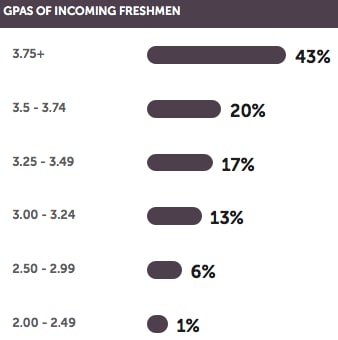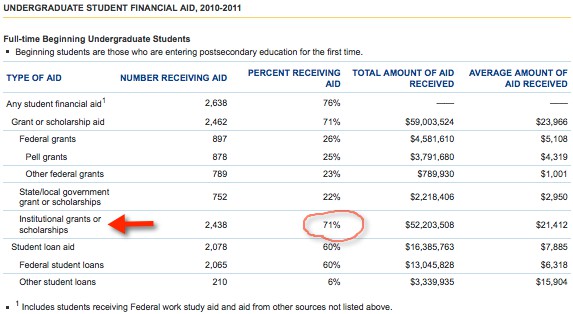
When students are shopping for colleges, admission representatives typically urge them to ignore the sticker price.
Here’s what these college reps routinely say: We’ve got lots of financial aid and scholarships. Just APPLY!
I was reminded of why applying blind is such a reckless strategy when a mom contacted me after her husband, who is a financial advisor, heard me give a college talk at a posh hotel in Los Angeles. Her son had gotten into Syracuse University, a private school in upstate New York. The kid is super excited, but the parents are stressing.
Getting Stiffed by Syracuse
The affluent family’s expected family contribution of $30,000 or so is much higher than most. The EFC is what the family would be expected to pay at a minimum for one year at Syracuse or any other school.
Since tuition and room/board at the university costs nearly $54,000 and books, travel and incidentals will boost that price, that would leave room for Syracuse to give this student some need-based financial aid or a merit award. But the teen got nothing. When I heard this, I asked about the teen’s academic profile and the mom said he had about a 3.4 GPA.
I’d suggest that the student’s academic profile is the problem. Most schools give their best awards to the students who will help them move up in the US News & World Report college rankings. At this school, a student with a 3.4 GPA isn’t going to do that.
When I checked the average grade point averages of Syracuse’s incoming freshman at the College Board, it showed that 63% of the students had GPAs of 3.5% or higher. A 3.4 GPA isn’t special at this school.
How Many Students Receive Grants
I then checked with the federal College Navigator and noted that 71% of students at Syracuse receive institutional grants from the school. Consequently, it’s not surprising that a child who was close to the bottom third of the class would receive nothing.
Coming Up Short at State Universities
The boy also didn’t capture money at any of the other schools that he applied to, which is somewhat unusual when you consider that two-thirds of college students who attend state and private schools receive some type of grant or scholarship. What’s more, 87% of students who attend private schools receive a price break in the form of in-house grants.
The student didn’t qualify for any need-based at the state schools in California that were on his list. That’s hardly surprising since the family makes too much money to receive aid at the lower-priced state schools. The other schools on his list were out-of-state public universities including Indiana University and I believe the mom said the University of Oregon.
What Public Universities Care About
Some state schools will give highly talented out-of-state students scholarships with top GPA’s and standardized test scores, but these state institutions are primarily focused on charging very high tuition to nonresidents to bring in needed dollars.
The teen’s GPA and presumably his SAT scores weren’t high enough to receive a price break from state universities, which routinely evaluate students based on their academic stats. In contrast, private schools and particularly colleges can take a more holistic admissions approach.
It’s not easy to be shut out of award money by every school on a teen’s list, but it happened to this family. Ironically, there would have been plenty of private schools that would have given this teenager a price break. The mom told me that she and her husband had enough saved to pay for one year of Syracuse. They aren’t sure what to do after that.
I feel for them.
More on The College Solution:
Tuition Hogs: The Priciest Schools in America
NOTE: I will be holding a college workshop at the University of California, San Diego on June 22. You can learn more about the event and how to sign up by heading to my workshop page. Lynn O.



Students and parents of color and immigrants make sure you ask many questions, seek out graduates and those who did not complete and ask questions. The past students may be subtle in the way they answer your questions, but read through the lines. Look for clues as some may not want to even speak with you. That is an answer. It is important because you are sending your child to experience hell after they enter. Don’t be fooled, white privilege is practiced among other things. Your child could end up in depression, and then you wonder why the kid is not functioning or is dropping out. Professors need to keep their jobs, and they tell students the results are on a bell curve. Grades are used as a tool to elevate or destroy, privileges are also practiced depending on the person and their own prejudices. Parents you pay a lot of money to have your children treated like crap in some instances. To students, tell your parents what is happening in all your classes and around you – do not keep it a secret. It is a lot of money and your future. You experience hell in neighborhoods dont pay to experience hell.
I think there is a fundamental problem with your logic. The college board site uses the common data set and that form that the colleges fill out does not state how gpa should be calculated. So it is up to the colleges to decide, they could report weighted, unweighted, core subjects only or whatever they want or nothing at all as some do.
That’s the problem with gpa in general. There is no consistent method and high schools have different grading systems e.g an A at one is 92 and above while another it is 90 and above. Also, there is no standard for what a 92 is worth vs a 98 on the 4.0 gpa scale.
I am sure the colleges report whatever makes them look good though.
We in CA and my daughter will be applying to Syracuse for fall2014. She has a GPA of around 3.7, will probably get higher after her two community college classes this semester. Her SAT and ACT scores are [below] average (1500 and 22). She has a lot of extracurriculars (well if they look at community service, internships, part time job, etc.). Do you think she has a shot at any merit scholarships?
Jus to add, she attends a very small charter high school of around 300 students, and she’s in the top 25% of the senior class.
Hi again,
I listen to your video on FA – very helpful!
Thank you!
Lynn,
Your blog certainly has opened my eyes! My son -is class of 2014 in NE. My question – my son has an unweighted GPA 90 – considered a B at his school – they do not rank but give ranges – wt is 112. He is in the top half a a competitive public HS so not a stand out- high SAT scores over 2000… So where does that leave him for merit money? His GPA is not a stand out anywhere but his SAT scores are. We will also be applying for FA.
Also we are looking at sm. colleges in NE where average test scores are lower. Will this be enough for merit?
Hi — It’s typically better to have a higher GPA than a higher SAT score. When it’s reversed some schools might think the student is a slacker if there is a significant gap. That said, with a high SAT score and good grades, he should get lots of merit scholarship offers. What I would do is use the net price calculator of schools to see what kind of packages he might get. Also, I would expand your search beyond where you live. I can’t tell if that is Nebraska or New England (NE). Applying in another region could help him because of schools’ desire for a mixed geographic class.
Good luck and please spread the word about my blog!
Lynn O’Shaughnessy
Hi, Lynn,
Thank you for your response. We live in Majne and my son would like to stay in New England. My son has challenged himself by taking honors and AP classes but has missed assignments which has lowered his grades. He is bright and remembers what he learns and ends up doing very well on Finals. He does have ADD -504 plan and his GC suggested he write a letter to admission office to explain the lower grades – do you agree?
Yes, your son must share with the admission office what his LD is. That would place some of this grades and/or test scores in contest. I would include this in the part of the application that says, what else do we need to know about you.
If you google my name and Lynn O’Shaughnessy, you will find stories I’ve written about learning disabilities.
Good luck.
Lynn O’Shaughnessy
So the take away here is that if you are going to be relying on merit money to swing a private school, make sure you’re applying to schools where you are confident that you’ll be in the upper tier of accepted students? Would that be an accurate summation? If so, the whole concept of a “reach school” is out the window.
Hi Mike,
If you need money for colleges, applying to reach schools is typically going to be a bad move financially. There can be ways to get better deals at private schools that evaluate students holistically if the child has other things going for him/her such as geographic, gender, ethnic diversity or talents that the school wants. Many schools offer special scholarships for talents and certain majors. You can find those by looking at MeritAid.com.
Lynn O’Shaughnessy
Mike, I recently came to this same conclusion.Luckily, we live in VA, so my kid’s “reach” schools can be UVA and W&M. All other schools on his list will be matches/safeties that are generous with merit aid. (Of course, he can apply anywhere he wants to, but it will be with the full knowledge that he cannot attend without significant merit aid.)
Thanks Phoebe, we have pretty much set the same limits on our son. We’re in CT, so Uconn is the fall back option. He doesn’t want a big university, however, so he will be applying to some private schools where he may have a shot at some merit aid. He loved University of Richmond in VA, but he likely will not stand out as an applicant.
I’m with Joy: It starts with the list. If you have no bad apples (i.e., all colleges meet your essential criteria, including probable cost), then there may be disappointments but none that blindside you.
Since I wrapped up working with my son on all of this and he’s about to leave for college, I have been surprised by how many families do not dig deep beforehand. I feel that I got all of my “what?!” shocks out of the way early on.
I couldn’t have done it without you, Lynn.
Denise
Thanks Denise!
Of course, i agree with you and Joy. The problem is that families don’t know how to draw up a good list of schools. Where are they going to get the information. After all, high school counselors typically don’t know how to do this.
Lynn O’Shaughnessy
Lynn,
WOW! I feel sorry for this student and his parents. Who the heck helped him create his college list?
Did no one think to have him apply to schools where he would be in the top of the applicant pools?
Joy
My son worked diligently, took classes at our local junior college, graduated with a weighted 4.25 GPA overall and was in the top 99% on both the SAT and the ACT. He received great scholarships and awards from small private colleges, all in the top 70-100 of the Kiplinger and Forbes rankings. However, he had a seriously declining high school GPA his junior year because he was a varsity athlete and suddenly opted out of the highly competitive, toxic environment at his “highly regarded” high school. His college classes saved his GPA and his applications. Perhaps admissions officers liked seeing how he could perform in a non-high school environment, or perhaps they know that too many students game the anti-intellectlual high school grading system. But applying to great colleges where his test scores were far above average worked out well financially. Colleges were more than generous and he is very happy with his final, non-ivy, small private college choice. His high school cohort applied to colleges where they were likely to be admitted–but few received enough scholarship and grant money to actually attend. As a result, almost 50% of his class is headed to junior college in the fall. Have your student “overmatch” with test scores and GPA–and grants and scholarships will follow.
My kid is in a tricky, related situation. I wonder if anyone has any experience with this. She goes to a well-regarded test-in high school where all kids take college courses exclusively junior and senior year, and 100 percent of kids go to college. Grading is tough at her school. Teachers routinely only give a few As and often Cs and Ds, and these are bright kids! Colleges recognize the difficulty of the school, and hopefully will see a 3.4 for what it really is . . but if they have some cut offs regarding merit awards, does that mean my kid won’t be eligible? Or do they weigh the classes? Or are kids penalized for going through difficult high schools? Thanks!
Hi — I sympathize with you because the high school you describe was a lot like my daughter’s. Very brutal grading. My daughter’s SAT scores was much higher than her grades (3.5 GPA) reflected for that reason. Colleges, as opposed to universities, will typically be more understanding of this. Colleges evaluate a child holistically while universities tend to weigh GPA, test scores and class rank more heavily. Schools will see the profile of your daughter’s school in the counselor report which can help and she can mention this situation in her applications.
Lynn O’Shaughnessy
Thanks — it just becomes so hard to estimate the possibility of merit aid because of this. Her ACT scores put her in the top 75% or above for these schools, but her grades look low. I’m not worried about her getting in, but I think she’s going to have to apply to a lot of schools to see who might give her money. Is it crass to ask the schools up front about merit aid?
Before applying to any schools you should run the net price calculator for each of them. If a school is too expensive, eliminate it from the list.
Lynn O’Shaughnessy
Then does the financial aid calculator include merit aid? I’ve only seen that on one school’s calculator (Eckerd), where she would automatically get $17,000 (nice!). If the calculator is based on UW GPA, my kid doesn’t look that great. It sounds like there’s no way of knowing, other than guessing by way of the percent of aid given to students deemed without need on the common data set.